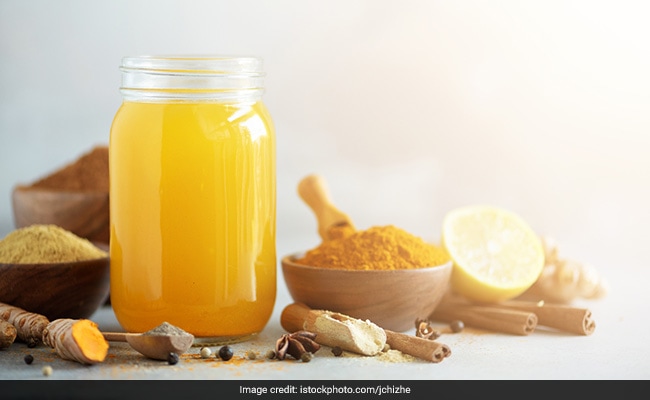
Turmeric is loaded with anti-inflammatory properties
Highlights
- Turmeric can help you fight symptoms of sinus
- You can drink turmeric milk regularly in winter season
- Turmeric will also help you control joint pain
Turmeric, the golden spice- is loaded with medicinal properties, according to Ayurveda. It is a super healthy spice that can offer you numerous health benefits, especially during the winter season. Turmeric adds colour to the food and also enhances the taste. It is loaded with anti-inflammatory and anti-bacterial properties. Turmeric also helps arthritis patients manage the symptoms.
As the winter season brings many challenges including joint pain, turmeric can be a effective solution. Here we’ve discuss some simple ways to use turmeric during the winter season.
Turmeric health benefits: Different ways to use turmeric
1. Haldi ka doodh
Turmeric milk or haldi ka doodh is a powerful source of antioxidants. You can drink a cup of turmeric milk before bed. It will keep your warm and reduce cold and cough symptoms.
It is also beneficial for diabetics as it can help in managing blood sugar levels. Do not forget to add some black pepper to it for better absorption of curcumin.

Turmeric: Prepare turmeric milk in winters to fight cold and cough naturally
Photo Credit: iStock
2. Turmeric tea
Sipping a hot cup of tea is the best part of a winter morning. You can swap your regular tea with turmeric tea. This healthy practice will boost your immunity and help you prevent various health issues associated with the cold weather. To prepare turmeric tea you need to first boil 3-4 cups of water. Add some turmeric powder to it or a few slices of fresh turmeric to it. Boil this water for some time. One it is done add some honey or lemon to it to enhance the taste.

Turmeric tea can be a perfect start to your morning
Photo Credit: iStock
Also read: Turmeric Tea: Amazing Health Benefits You Cannot Afford To Miss; Learn How To Make Turmeric Tea
Health benefits of consuming turmeric in winter
1. It can help you control joint pain
2. Turmeric can give you relief from cold and cough
3. It helps you fight inflammation
4. It will boost your skin health
5. Adding turmeric to your diet can also give you relief from symptoms of sinus
Disclaimer: This content including advice provides generic information only. It is in no way a substitute for qualified medical opinion. Always consult a specialist or your own doctor for more information. NDTV does not claim responsibility for this information.




